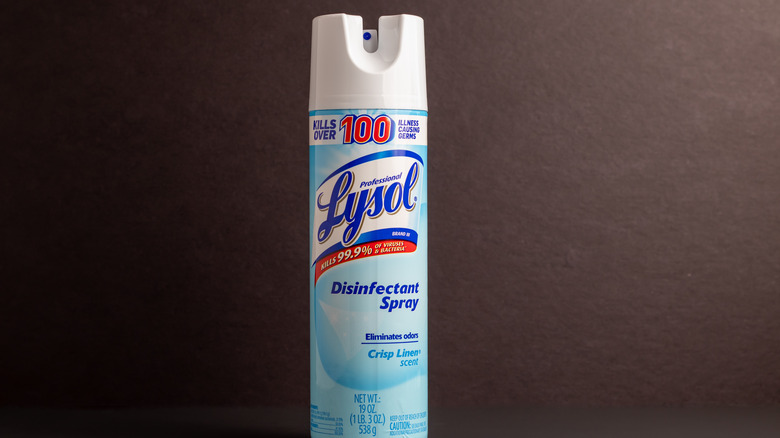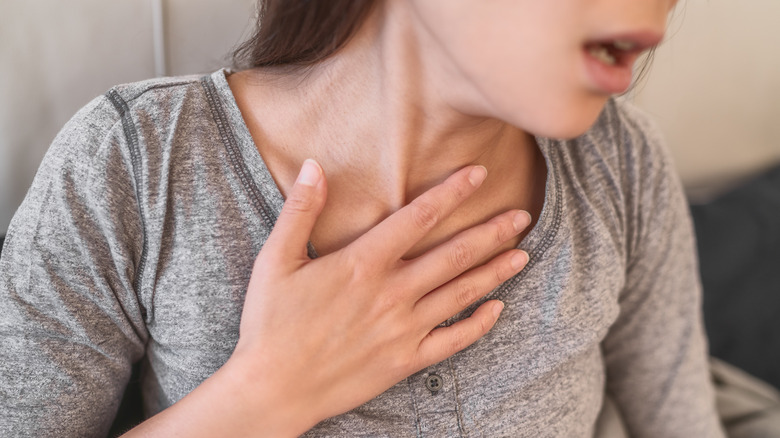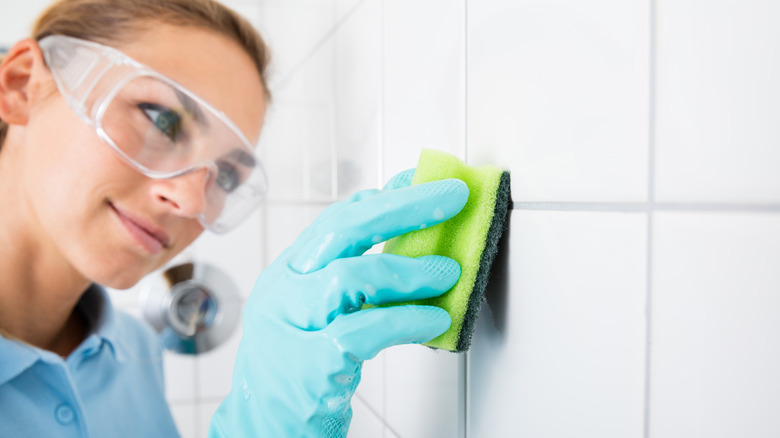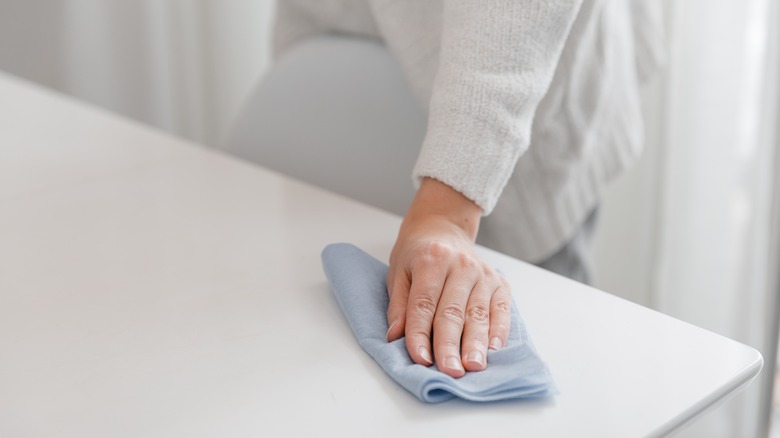Why You Should Stop Using Lysol Immediately
Lysol products are a staple in many homeowners' cleaning arsenals — after all, the brand of disinfectant and cleaning products have been a household name since 1889, as Bloomberg reports. In the early years, Lysol was used to combat the spread of cholera and the Spanish flu, and while the stakes aren't quite as high nowadays, modern users still hope the product will kill any pesky germs and viruses that may linger on their home's surfaces. That became even more important in recent years with the COVID-19 pandemic. As per CNBC, the U.S. Environmental Protection Agency approved two of Lysol's products for killing COVID-19 when it lingers on surfaces, and the brand's name recognition meant that sales were up back in 2020 when everyone was looking for disinfectants.
However, Lysol's powerful cleaning properties go hand-in-hand with a variety of chemicals in the stuff needed to get the job done, which not everyone is a fan of. In fact, Kitchener Clean shared the results of The Nielsen Global Home-Care Survey, which stated that 30% of North American survey respondents were interested in eco-friendly all-purpose cleaners, while 26% of respondents said that buying natural or organic cleaning products was a priority. And it's no wonder — one in three chemical cleaners have some type of ingredient that can be harmful to your health or the environment.
Lysol can worsen respiratory symptoms
Lysol has a range of different products, including wipes that you can use on surfaces in your home. However, most of them, whether multi-purpose cleaners or disinfecting sprays, are applied by spraying or spritzing them around your home. Since we're betting most people don't bother putting on a respirator when they're just tidying up around the house, this means that while you're cleaning, you're inhaling all those particles that are floating through the air.
While they didn't single out Lysol in particular, a study undertaken by University of Bergen researchers examined the impact of cleaning sprays like Lysol on women who either worked as cleaners or regularly used such sprays at home. As WebMD explained, the researchers found that the impact on lung health was as damaging as smoking 20 cigarettes a day for 10 to 20 years. The same study also found that those who regularly cleaned with such sprays were about 2% to 3% more likely to have asthma.
This is likely due to the volatile organic compounds that many cleaning products release, as the American Lung Association explains. If you find your respiratory system is particularly sensitive to such substances, you'll want to look for options that don't have fragrances, flammable ingredients, or volatile organic compounds. Or, simply avoid harsh cleaners altogether — natural alternatives like warm water and soap, or a vinegar and water mixture, can be quite effective with none of the risk.
Lysol is a known skin and eye irritant
If you thought your lungs were the only body part that could potentially be irritated or impacted by harsh chemical cleaning products, think again — they're also known to harm your skin and eyes, thanks to some of the ingredients within these substances. For example, Lysol contains a hazardous ingredient known as phenol, which the CDC says poses a health risk. This means that if your skin is exposed to Lysol in some way while you're cleaning, it could trigger anything from hives, a burning sensation, or severe swelling in extreme examples, or redness and slight inflammation in more mild reactions.
Additionally, benzalkonium chloride, another ingredient commonly found in Lysol, is actually a known carcinogen that is known to cause blindness in humans, as Dr. Eric Lee told Hunker. In fact, the FDA actually included benzalkonium chloride on their list of banned chemicals for a period, before they ended up reversing that decision.
If you simply can't give up your favorite products, you may want to use both safety glasses and gloves in order to reduce exposure that may irritate your skin or eyes.
Lysol may be unwise if you have pets
Those who share their homes with a four-legged friend or two may want to reconsider their Lysol use as well, given how the cleaning products can impact animals. Phenol, the same ingredient that can potentially irritate your own skin and trigger a reaction, can cause burns or irritation for your pets as well. As Quality Dog Resources explains, even the action of licking their paws after touching the disinfected but still damp surface could be dangerous for your pets.
Phenol impacts cats most seriously because they are unable to process the ingredient, as Tampa Veterinary Hospital explains, and it could trigger health issues as serious as liver failure. Now, issues like this usually stem from exposure to or consumption of quite large amounts of the cleaning product, but still — if potentially harming your furry family members makes you nervous, you should either switch to a natural alternative, or at the very least, ensure any areas being cleaned are pet-free until they're completely dry. This will avoid the issue of your pet walking across a surface damp with disinfectant and absorbing that moisture with their paws.
Just as you would if you had small children, you also want to store your household cleaning products in a place where your pet can't accidentally access them, as noted by Hello Ralphie. You'll also want to air out any fumes while you're cleaning.
Lysol could damage certain surfaces
Even if you have no pets to worry about and are committed to using a respirator, safety glasses, and gloves to significantly reduce any potential health impacts of chemical-based cleaning products, there's one other thing to consider: your home itself. Simply put, those pesky chemicals can wreak havoc on certain surfaces if you're not careful.
As Clorox Pro explains, frequent use of certain cleaning or disinfecting products could cause permanent damage in the form of hairline cracks or dullness on surfaces in your home. In extreme cases, you might even see corrosion or more significant cracks in certain materials. While it may seem silly to clean an area twice, once the disinfecting product has done its job on a surface, you'll want to wipe it with a clean, damp cloth to remove any potentially damaging residue. You'll also want to consider the type of surface you're cleaning before using certain cleaning products. For example, as The New York Times reports, Lysol is fine on the majority of hard surfaces but shouldn't be used on leather, silk, acrylic plastic, or painted wood.
If you're ever uncertain about whether a cleaning product will damage a certain surface, you may want to test it out on a less visible area before using it on the whole surface, just in case.




